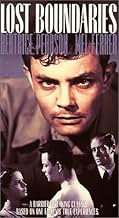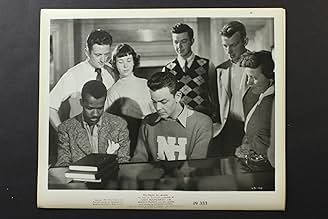PUNTUACIÓN EN IMDb
7,0/10
606
TU PUNTUACIÓN
Añade un argumento en tu idiomaA fair-skinned African American doctor faces discrimination in 1940s America. Unable to find work as himself, he reluctantly "passes" as white, building a successful life in New Hampshire un... Leer todoA fair-skinned African American doctor faces discrimination in 1940s America. Unable to find work as himself, he reluctantly "passes" as white, building a successful life in New Hampshire until WWII exposes his heritage.A fair-skinned African American doctor faces discrimination in 1940s America. Unable to find work as himself, he reluctantly "passes" as white, building a successful life in New Hampshire until WWII exposes his heritage.
- Dirección
- Guión
- Reparto principal
- Premios
- 4 premios y 4 nominaciones en total
Susan Douglas Rubes
- Shelly Carter
- (as Susan Douglas)
Robert A. Dunn
- Rev. John Taylor
- (as Rev. Robert A. Dunn)
Rai Sanders
- Dr. Jesse Pridham
- (as Rai Saunders)
Reseñas destacadas
Lost Boundaries I felt was a really good film. Never would have even thought of something like it. The family had such good hearts and were caring and loving people who got along with everyone they met pretty much. No body knew they were actually African American though. If people had known they would not have had the life they lived for such a long time. He wanted to tell people. He did not want to have to keep his race a secret just so he would be treated differently. Its sad to think that people were really like that. This movie has a great ending however. You think for a little while that once their secret was revealed that they were going to be shunned by everyone. They were at first too except for the daughter with her boyfriend. He never let it bother him. She was more ashamed of it than he was which is also very sad. Those kids grew up just like all the other white kids thinking that being a Negro was a terrible thing and even though the son was kind to them and one of his best friends was Negro he was not pleased and was disgusted when he found out he was actually African American himself just very light skinned. But the town comes around when in church the preacher preaches about how that is not how God would do things. God loves everyone and treats everyone equally and it was at the end of the service that people let go of the grudge they had against different colors. They also kept him as their town doctor. I saw many things in this film that I would be appalled to see actually happen to day but that doesn't change the fact that that is how the times were then and just how people acted.
The topic of racial boundaries is explored in fine detail in this story about a light-skinned doctor and his family who all pass for white in a New England town. All points of view and opinions are represented. What makes this such a remarkable film is that it was made in 1949, hardly a year of profound social change in America when it came to the color line. This makes the movie that much more daring. A much better look at the topic of passing than either Pinkie or the second version of Imitation of Life (the first was quite extraordinary, and far superior). There are some really wonderful scenes including one at the town dance when the doctor's son brings home a dark-skinned black friend. The levels of acceptance and non-acceptance of the young black man are nuanced and played out beautifully.
The film suffers a tiny bit from hokey dialogue and mild melodrama, but that is more a result of the year it was made.
The film suffers a tiny bit from hokey dialogue and mild melodrama, but that is more a result of the year it was made.
On a famous Law And Order episode S. Eptha Merkerssen confronts a suspect who has passed for white asking him what it was like. It must be a unique experience. But it's one gay people for generations did with use of the closet. I think Mel Ferrer's real life character of Scott Carter would have identified with the closet. He was in fact in a race closet.
Mel Ferrer got his first big break playing the lead who with his wife Beatrice Pearson is a light skinned black man, one who has 'good color' so he can pass. After losing a job at a hospital he was hoping to get Ferrer gets a position at a small Maine village, not unlike Bing Crosby coming to work to take over Barry Fitzgerald's practice in Welcome Stranger. But Bing wasn't exactly carrying the secret Ferrer has. He and Pearson never even tell their kids.
It all comes crashing down when a background check on Ferrer disqualifies him from a Naval commission. The only place for black people in those days was mess stewards. The rest of the story is how Ferrer and his family deal with being ripped from the racial closet and the town around him.
In the climax the town preacher Robert Dunn who was a real minister as well speaks for the town and how they deal with this knowledge about their trusted town physician.
Mel Ferrer got his first big break in Lost Boundaries and while it's not quite a classic it holds up well for today's audience.
Might be a good film for a gay black audience to view.
Mel Ferrer got his first big break playing the lead who with his wife Beatrice Pearson is a light skinned black man, one who has 'good color' so he can pass. After losing a job at a hospital he was hoping to get Ferrer gets a position at a small Maine village, not unlike Bing Crosby coming to work to take over Barry Fitzgerald's practice in Welcome Stranger. But Bing wasn't exactly carrying the secret Ferrer has. He and Pearson never even tell their kids.
It all comes crashing down when a background check on Ferrer disqualifies him from a Naval commission. The only place for black people in those days was mess stewards. The rest of the story is how Ferrer and his family deal with being ripped from the racial closet and the town around him.
In the climax the town preacher Robert Dunn who was a real minister as well speaks for the town and how they deal with this knowledge about their trusted town physician.
Mel Ferrer got his first big break in Lost Boundaries and while it's not quite a classic it holds up well for today's audience.
Might be a good film for a gay black audience to view.
Others have described Lost Boundaries very well here, so we will not retrace the plot. As we watched this movie on TCM, it again reinforced our feeling that the movie industry has in some ways lost its way today. From what we can see, while Lost Boundaries was well reviewed by contemporary viewers, it was not particularly recognized when it was made. Nevertheless, being a modest production of its time, it easily surpasses so many movies made today with far greater resources in terms of budget, "star power," and other means. When the industry focused on telling human stories with human beings, it was much more convincing. Today, there is so much focus on marketing, gimmickry, "star" power, and extraneous things like special effects and post-production polishing that it seems the stories lack that "human touch."
We live in Hawaii, and recently saw "The Descendants" out of natural curiosity to see our home state featured, and our response, and that of others we know, was lukewarm. The story seemed to lack depth and any real investment of characters to any stakes (since it was in part about land and wealth), yet it is being touted for Best Picture and more. Clooney was already given Best Actor in the Golden Globes, and our belief is that the award is being rigged because he is a Hollywood favorite and insider. It is a typical Clooney job...glib and slightly sarcastic, and it baffles us that it merits any such recognition.
Occasionally someone makes a great picture because talent is irrepressible and will always emerge, but now it seems to be in spite of the industry rather than because of it. It seems that the television producers seem to have passed the feature film producers in telling stories (Mad Men, Breaking Bad). Tell stories with people, about people, by people...please.
We live in Hawaii, and recently saw "The Descendants" out of natural curiosity to see our home state featured, and our response, and that of others we know, was lukewarm. The story seemed to lack depth and any real investment of characters to any stakes (since it was in part about land and wealth), yet it is being touted for Best Picture and more. Clooney was already given Best Actor in the Golden Globes, and our belief is that the award is being rigged because he is a Hollywood favorite and insider. It is a typical Clooney job...glib and slightly sarcastic, and it baffles us that it merits any such recognition.
Occasionally someone makes a great picture because talent is irrepressible and will always emerge, but now it seems to be in spite of the industry rather than because of it. It seems that the television producers seem to have passed the feature film producers in telling stories (Mad Men, Breaking Bad). Tell stories with people, about people, by people...please.
The production of this film is so so. Nothing to brag about. But the subject content and the way it was approached, at least for the time that it was produced and shown, this was a groundbreaking film. No wonder it was banned from many movie theatres in the South and in the north, simply because it speak truth to power and it humanized black people. Once you're able to humanize something or to empathize with it, you're less likely to abhor or hate it. That's why this movie is so great, and it's why it got so much flak from White America for portraying such truth.
¿Sabías que...?
- CuriosidadesBased on the lives of Albert and Thyra Johnston, who lived in New Hampshire in the 1930s and '40s.
- PifiasWhen the townsfolk are "whispering" among themselves about the Carters being "colored", their lip movement doesn't match what's being said.
- ConexionesFeatured in Classified X (2007)
Selecciones populares
Inicia sesión para calificar y añadir a tu lista para recibir recomendaciones personalizadas
Detalles
- Fecha de lanzamiento
- País de origen
- Idioma
- Títulos en diferentes países
- Lost Boundaries
- Localizaciones del rodaje
- Barrington, New Hampshire, Estados Unidos(Calef's Country Store)
- Empresas productoras
- Ver más compañías en los créditos en IMDbPro
Taquilla
- Presupuesto
- 250.000 US$ (estimación)
- Duración1 hora 39 minutos
- Color
- Relación de aspecto
- 1.37 : 1
Contribuir a esta página
Sugerir un cambio o añadir el contenido que falta

Principal laguna de datos
By what name was El color de la sangre (1949) officially released in India in English?
Responde





























